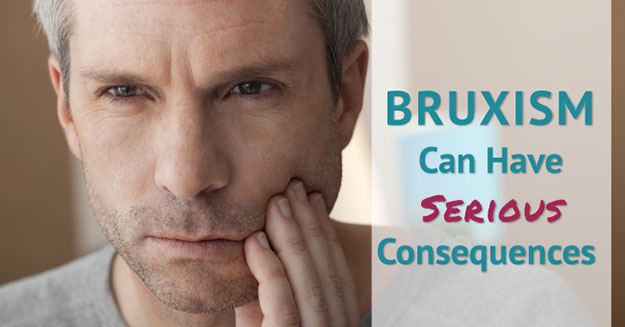
There is no mistaking a toothache- and when you have one, you quickly make an appointment with our office. The symptoms of bruxism, or teeth grinding, are often not as obvious and they can be mistaken for other problems. But bruxism is a serious dental concern and way more common than most people think.
Bruxism even affects children. Bruxism can cause a tooth to fracture, potentially to the gum line, and often times the tooth is not restorable. This is one of the primary reasons for extractions in our office. Some people grind and/or clench their teeth incessantly, and the force of grinding can exert as much as 600 pounds of pressure on their teeth. It’s easy to understand how this force could have serious effects on your teeth.
The following are some of the consequences that can occur due to grinding:
- Your teeth can often become shorter, fractured, chipped or loose. Even implants and crowns can be adversely affected. Porcelain crowns and veneers can fracture.
- You may wear through the enamel of your teeth, exposing the dentin.
- Your teeth may become painful and sensitive to pressure/chewing and your jaw, neck and face muscles can feel tired, painful or tight. Your jaw may click upon opening/closing.
- Your grinding may be loud enough to interrupt your sleep or that of your partner.
One of the most common factors contributing to bruxism is stress and anxiety.
We see many patients around the Thanksgiving and Christmas holidays with multiple signs of bruxism- primarily sensitive teeth or fractured teeth. Another factor that can cause bruxism is an uncomfortable bite.
Fewer than 10% of people that grind their teeth are actually aware of it. If you experience any signs of bruxism, it is important to let us know. A course of action may be recommended that includes wearing a nightguard to protect your teeth or braces to correct a faulty bite.
You can take steps to alleviate the symptoms:
- Eliminate any gum chewing.
- Try “bed rest” for the jaw- eat foods that do not require a lot of chewing.
- Relax your jaw by applying warm, moist heat- a washcloth works well for this. Alternate with ice. Do this several times per day.
- Train yourself to relax your jaw if you notice that you are clenching your teeth.
- Be vigilant about wearing a nightguard. This will help protect your teeth from breaking.
Bruxism may not be as obvious as a cavity, but it can have serious consequences.
It’s important to take preventive steps if you notice signs of grinding your teeth. Severe bruxism can lead to damaged teeth and gums and the potential loss of some teeth.



